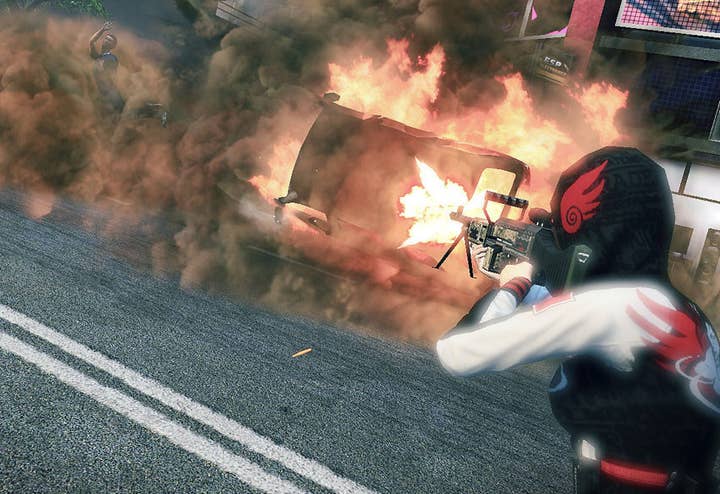Saving APB
How Reloaded productions is rebuilding Realtime Worlds' MMO
"We felt that a lot of people just didn't get it. That's a bit of a cop-out, to say 'you're playing it wrong' - it was just as much our fault as anyone else's. We know our tutorial stuff wasn't the strongest, but it's so hard to do tutorials for a game like this. Games like Team Fortress 2 are only just adding tutorial sections, and that's just to tell you how to switch weapons and fire. There's so much more in APB."
Tutorials are certainly welcome. APB is a difficult and complicated game with a highly skilled core audience. Poor matchmaking and a lack of signposting blighted the 2010 release, partly a result of time running out as the release date approached.
"We were still finishing off pretty much core features right until the end," Stevenson recollects of Realtime. "Finishing rather than polishing, which is maybe partly why things went wrong. Now, we know the core game works; now it's about asking the community what they want."
Listening to players has been a vital part of the process of resurrecting the game. I ask Michael Boniface how much of the work on APB Reloaded has been a result of player feedback.
"Probably about 70 per cent. Really high. We were very focused on the community, right from the outset.
"Before we even looked at the revenue models within the game, the important thing was to get from the product we had to the product we wanted. Essentially, with a F2P game, if it's not fun you don't make any money, no matter how your charging structure works."
Ultimately, as soon as you give people the option to just wear pants and paint their body red and run around, that's exactly what they're going to do
Jack Oakman, art director, Reloaded Productions
"I think it's funny, you get a certain amount of...aggressive feedback, shall we say, on certain elements of the game. What we've found is that the most aggressive ones - the ones who are coming in and saying, 'I can't believe you think you can charge this for that, I'll never play your game again' - when you investigate and find out who they are, they've been premium since day one. They've bought everything in the marketplace. They play the game all the time.
"I think that because it's free to play, people feel in control of their purchases. That's the point."
Art director Jack Oakman agrees, adding that proper engagement with customers has done more than just fix bugs, it's also changed the fundamental way that the company looks at the game, loosening some of the authorial intent to allow players more freedom and ownership.
"We're a lot more focused on what the players are telling us and what they want," he says of the "reloading" process.
"Since we got here we've been trying to find those meaningful assets that take you from a character that's a customisation, to something that's a character in its own right. So, the beret, the cigar hanging out of the mouth, the eye patches and so on. Letting the character be someone you want to be.
"We're coming to realise, as APB moves on, that you can dress it up as a gritty crime thriller all you like - ultimately as soon as you give people the option to just wear pants and paint their body red and run around, that's exactly what they're going to do. So that illusion can only be sustained to a certain degree. It's kind of an interesting experiment as we develop, in trying to sort of embrace all of the beauty of what customisation means to a player, but also at the same time create a context which at the same time seems viable, credible.

"There can't really be a defined experience if you give people that much control over how they present themselves. Gone is the running street battle in Heat. I mean, you can have it, but there are going to be people dressed as penguins."
Again, Oakman sees the passion and engagement of the team at Reloaded Productions as the key to the game's future. APB's original incarnation was a job half done, he says, but refinement had always been part of the gameplan.
"We're definitely more focused, more agile now. We have to be. With big companies, when there's so many chains of communication, it's not really surprising that the message can get slowed down a lot. I think anyone who's worked anywhere can appreciate that. So certainly we are much more autonomous in this role. In our ability to drive what we're doing.
"But of course that has to come from understanding your game. We've got the right team to do it. There's not one person in this office who doesn't understand what we're about, who doesn't have love for this project, to make it what it was always supposed to be. APB was always supposed to be iterated upon. This stuff was always supposed to happen. When it didn't, that came as a huge surprise, because that's what we'd been working towards."








